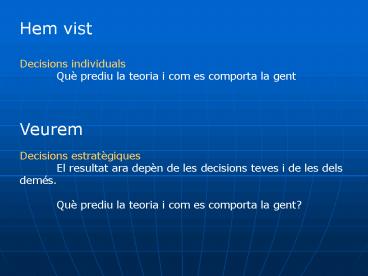Recapitulaci: PowerPoint PPT Presentation
1 / 20
Title: Recapitulaci:
1
Hem vist Decisions individuals Què prediu la
teoria i com es comporta la gent Veurem Decisi
ons estratègiques El resultat ara depèn de les
decisions teves i de les dels demés. Què
prediu la teoria i com es comporta la gent?
2
Què diu la teoria?
3
(No Transcript)
4
- Anem a veure si es compleix.Joc de cartes.
- Si jugues la vermella guanyes 2.
- Si jugues la negra no guanyes res però laltre
guanya 3.
5
(No Transcript)
6
Noves instruccions Carta vermella, guanyes
2. Carta negra, laltre guanya 8.
7
(No Transcript)
8
Conflicte Entre incentius (socials) de cooperar
i incentius (privats) de buscar linterès
propi Machiavellli stresses civic virtues. Civic
traditions of cooperation and trust (exemple de
Napols). Adam Smith, lucre personal com a motor
de leconomia (Wealth of Nations), virtuts
cíviques com a motor de leconomia (Theory of
Moral Sentiments). Tocqueville (Democracy in
America). Putnam Making democracy work (1993),
Bowling alone (2002) (associations, credit,
capital social normes de reciprocitat i
reticules de relacions civiques), Fukuyama Trust
(1996) Coopetition Cooperació en la producció
i competencia en el repartiment.
9
Conflicte bgtcgtagtd THEORY It is
self-evident how an intelligent individual should
behave1) One-shotDominant strategy is the
non-efficient equilibrium (cgta)2) Finite game
Even with thousands of trials, not a single
efficient equilibrium predicted.No convergence
to infinitely-repeated game.
10
- Equilibri subóptim. One-shot away from 0 or
100 cooperation - Què passaria si es repetís el joc entre els
mateixos jugadors? - I entre jugadors diferents?
- Què passa si sanuncia el nombre de períodes que
es juguen? - What is an infinite game Fixed probability of
finishing it affects results more cooperation
when probability of continuing is larger.
11
Dilema de los presos, Andreoni, Miller, EJ 1993
12
Three experiments Selten Stoecker (1986) 25
supergames of 10 periods. In each supergame a
pattern of cooperation, defect and defect all the
way. In the experiment, the moment of defection
moves earlier. In the last 5 supergames, no
cooperation at all. Theorys prediction is too
extreme, but better approximation with practice.
13
Observation leads to a theory of learning and to
new theories of decision making as inb. Kreps,
Milgrom, Roberts and Wilson (1982) Rational
behavior when you have doubts about rationality
of your opponent. c. Andreoni Miller (1993)
Building a reputation. Reciprocal altruism
(cooperate until experience shows that they
are taking advantage...). Pure altruism
(taking pleasure in others pleasure).
14
And one set of simulations Axelrod, The
Evolution of Cooperation (1984) Computer
tournaments a. on a 200-play repeated PD.b.
P.99 of continuing (only the first half of
entries and Tit for Tat would have been 4th after
25, 16 and 8.Variations-Letting subjects talk
to each other-Letting subjects choose their
partners-Letting them know each other in a local
interaction
15
(No Transcript)
16
(No Transcript)
17
(No Transcript)
18
Field centipede
19
(No Transcript)
20
(No Transcript)

